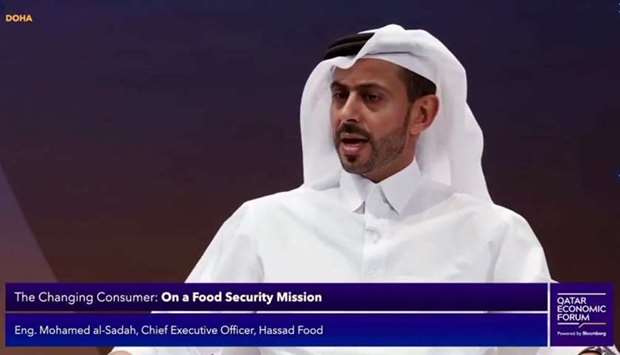Qatar has to further strengthen its Greenhouses and vertical farming to address the key issue of food security, according to a top official of Hassad Food, an investment fund in food and agri sectors and backed by the country's sovereign wealth fund.
Addressing one of the sessions at the third edition of Qatar Economic Forum, powered by Bloomberg, Hassad Food chief executive Mohamed Badr Hashem al-Sadah said the game of food security is the supply chain.
Asked how Qatar has been able to grow more local produce amidst harsh climate; he said that's where the technology and research and development (R&D) come into play.
Highlighting that technology and R&D help close the gaps in the supply chain and therefore in the food security; he said Greenhouses and vertical farming are the "only ways through which we can close the gap".
Mahaseel for Marketing and Agri Services Company, a subsidiary of Hassad, recently disclosed that it successfully marketed 10mn kg of local produced vegetables in the Qatari market, since January 2021. It represented a more than doubled growth year-on-year.
Mahaseel currently markets 30 different vegetable varieties in the local market, through 44 hypermarkets outlets around the country. Moreover, 200 local farms are registered with Mahaseel, to benefit from the marketing and agricultural services provided to them.
Hassad Food, whose international investment portfolio includes Australia and Oman, has been entrusted with supporting the needs of Qatar's growing economy, while at the same time realise profitable and sustainable business objectives.
The official said Hassad Food’s basic strategy was developing the food sector locally and developing the system to store those products that cannot be grown in the country.
"We position ourselves as investment fund in the food and agri sector, under the umbrella of the QIA," said al-Sadah, who assumed the role of chief executive at a crucial time when Qatar was going through the Gulf crisis period.
"The first mandate (before me) was to close any gaps (in the supply chain) for which we had initiated talks more than six to seven countries," he said, adding it "managed to stabilise the market within seven days and that was the success for Hassad".
Internationally, Hassad invested in key strategic establishments in Australia, Canada, Turkey, Oman, Saudi Arabia and Sudan, while in Qatar, Hassad owns multiple subsidiaries that directly manage the company’s key investments. Hassad also has a major role in crisis management and in the field of research and development.
At the recently concluded St Petersburg International Economic Forum, Hassad Food had disclosed that it was exploring investments opportunities in Russia in the fields of grain production, meat processing and agriculture technology, as part of strategy to expand its global footprint.
Addressing one of the sessions at the third edition of Qatar Economic Forum, powered by Bloomberg, Hassad Food chief executive Mohamed Badr Hashem al-Sadah said the game of food security is the supply chain.
Asked how Qatar has been able to grow more local produce amidst harsh climate; he said that's where the technology and research and development (R&D) come into play.
Highlighting that technology and R&D help close the gaps in the supply chain and therefore in the food security; he said Greenhouses and vertical farming are the "only ways through which we can close the gap".
Mahaseel for Marketing and Agri Services Company, a subsidiary of Hassad, recently disclosed that it successfully marketed 10mn kg of local produced vegetables in the Qatari market, since January 2021. It represented a more than doubled growth year-on-year.
Mahaseel currently markets 30 different vegetable varieties in the local market, through 44 hypermarkets outlets around the country. Moreover, 200 local farms are registered with Mahaseel, to benefit from the marketing and agricultural services provided to them.
Hassad Food, whose international investment portfolio includes Australia and Oman, has been entrusted with supporting the needs of Qatar's growing economy, while at the same time realise profitable and sustainable business objectives.
The official said Hassad Food’s basic strategy was developing the food sector locally and developing the system to store those products that cannot be grown in the country.
"We position ourselves as investment fund in the food and agri sector, under the umbrella of the QIA," said al-Sadah, who assumed the role of chief executive at a crucial time when Qatar was going through the Gulf crisis period.
"The first mandate (before me) was to close any gaps (in the supply chain) for which we had initiated talks more than six to seven countries," he said, adding it "managed to stabilise the market within seven days and that was the success for Hassad".
Internationally, Hassad invested in key strategic establishments in Australia, Canada, Turkey, Oman, Saudi Arabia and Sudan, while in Qatar, Hassad owns multiple subsidiaries that directly manage the company’s key investments. Hassad also has a major role in crisis management and in the field of research and development.
At the recently concluded St Petersburg International Economic Forum, Hassad Food had disclosed that it was exploring investments opportunities in Russia in the fields of grain production, meat processing and agriculture technology, as part of strategy to expand its global footprint.




